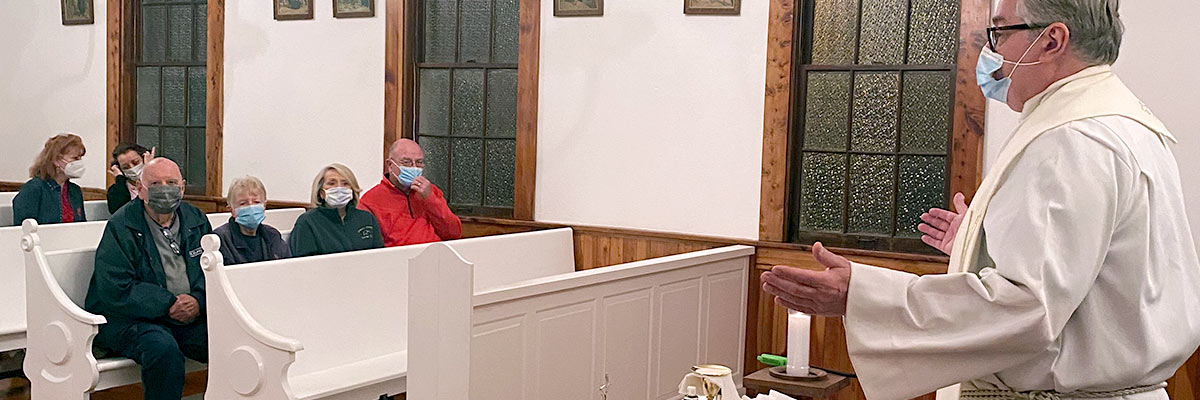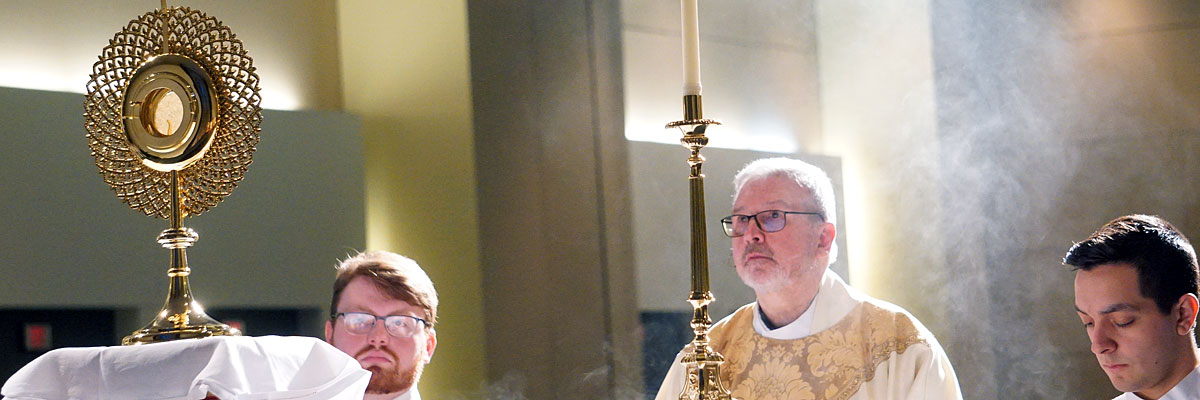Official Website of the
Catholic Diocese of Little Rock
Eighteenth Sunday in Ordinary Time
Published: October 9, 2025
Bishop Anthony B. Taylor preached the following homily Aug. 2, 2025.

Bishop Taylor
Today is my 45th anniversary of ordination to the priesthood, and tomorrow is the anniversary of my first Mass. For some reason, I didn’t realize that it is customary for the newly ordained priest to invite someone else to preach his first Mass, and so I ended up preaching my own first Mass, which, like today, just so happened to be the 18th Sunday of Year C and so the readings were the same readings you just heard. Meaning that it was with the parable of the Rich Fool that my ministry began.
Since none of you were there, I thought I would share with you parts of my message from 45 years ago because that Gospel has marked my ministry ever since. So here it goes:
"Today's Gospel bears a powerful message and is a fitting warning for me as I begin a lifetime of ministry in the Lord's service. But not just for me — the message is meant for all of us.
There is an old proverb that said that "money is like sea-water, the more a person drinks, the thirstier he becomes."
The Gospel starts with the younger of two brothers complaining that the older brother refuses to give him his share of their inheritance. The elder brother would rather leave the inheritance undivided — such joint ownership was highly esteemed in those days. The younger brother has other ideas, though, and so he appeals to Jesus. Jesus, for his part, however, refuses to give a decision, primarily because he considered the possession of property to be irrelevant to the message of the coming of the Kingdom that he had come to proclaim--not evil, simply of no importance. What is important is our relationship with God — riches can affect that relationship, and it is this that Jesus is warning us about.
To make his point about how riches can harm our relationship with God, Jesus tells us the parable of the Rich Fool. There was a farmer whose land was so fertile that it produced more grain than his barns could hold. He became proud in his self-sufficiency and built even bigger silos for his grain and for all the riches he was able to buy with that grain. He felt more and more self-sufficient, and saw himself as the self-made man--he got to where he was by his own hard work, rags to riches — he laid back plenty for a good retirement, looking forward to many years of the "good life" — eating, drinking, being merry.
Jesus calls this man a "fool." Why? He sounds to me like a responsible provider for his family, a man in control of his destiny. Why does Jesus call this man a fool? The reason this man is a fool is that he let the very riches that God had given him separate him from God. In his feelings of self-sufficiency, he counts his prosperity to be the result of his own hard work — in practice, he denies God's existence.
In his planning for his future retirement, the "good life" that he thought lay before him, he forgot to take God into account; he was blind to the threat of death hanging over his head, and this blindness was due to the fact that he had made himself (not God) but himself the measure of all things. And so, he couldn't (wouldn't!) look beyond the present life, over which we do have some control, to the day of Judgment and the life beyond.
To be a priest is a great privilege and a tremendous responsibility. Today's Gospel warns me not to forget that all the powerful work done in ministry comes not from the priest's own human abilities, wisdom and merit, but rather from the powerfully effective work of the Holy Spirit. I, the minister, am only the vessel for the Spirit; it is God who acts.
Today's Gospel speaks powerfully to me, as a priest. But not just to me; it speaks to all of us. We are all exhorted to look beyond ourselves. Human nature is to make the self the center of our own personal lives — Christ's call is that God should be the center, not the self.
There was once a girl about whom it was said, "Edith lived in a little world, bounded on the north, south, east and west by Edith." Self-centered Edith is like the Rich Fool in today's Gospel. There is an old proverb that said that "money is like sea-water, the more a person drinks, the thirstier he becomes."
So long as a person centers his life on his own struggles for self-sufficiency and forgets those in need and the God who has made all this possible — so long as a person aggressively affirms himself, his desire will always be to get more. This attitude, against which we all have to struggle, is the very reverse of Christianity.
Christianity affirms that true happiness comes from giving, from pouring ourselves out for others, from centering our lives on Christ, who gave and gave of himself all the way to the cross — Christ whose body and blood we will eat and drink in just a few minutes. This is what Christ came to teach us. It is the truth to which my ministry as a priest is dedicated. This is the truth into which all of us have been baptized as Christians. This pouring of ourselves out for others is at the center of our lives as Christians. Jesus Christ, not ourselves, but Jesus Christ is the true heart and center of our lives.
Please pray for me, that I may always bear Christ's word faithfully, not watered down, in season and out of season, when people want to hear it and when they don't. And I will pray for you, that you may always be faithful Christians, men and women of deep, sincere, self-giving love, undying zeal, patience and unwavering faith. God bless you all.”
With that, my first homily as a priest ended, and my ministry as your servant began.









